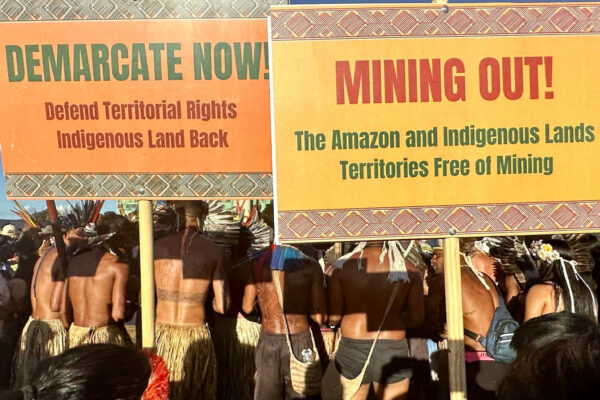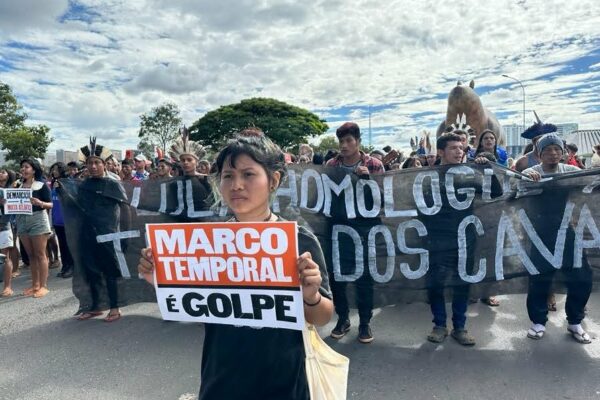Honorable Dilma Vana Rousseff
President of the Federative Republic of Brazil
Brasilia, DF, Brazil
Tel: (+55-61) 3411-1200 / 3411-1201
Fax: (+55-61) 3411-2222
Email: gabinetepessoal@presidencia.gov.br, casacivil@planalto.gov.br
Dear President Rousseff,
We are writing to express our deep concerns regarding the implementation of the precautionary measures (MC-382-10[1]) requested by the Interamerican Commission on Human Rights (IACHR) on April 1st 2011 to safeguard the rights of indigenous peoples – including groups living in voluntary isolation – threatened by the construction of the Belo Monte Hydroelectric Dam Complex in the Amazonian state of Pará. We are also deeply distressed by your government’s recent reaction to withdraw its candidate for Commissioner in 2012, and according to Brazilian media,[2] threatening to pull funding from the Inter-American Commission on Human Rights.
If implemented, both these decisions will weaken the respect for human rights and environmental protection in Brazil and the Americas and tarnish the countries’ reputation as a leader in the region. Therefore we respectfully request that the Brazilian government comply with the IACHR resolution and abstain of the intention to withdraw funding from the OAS.
As organizations that work on human rights issues, we are interested to see that the Brazilian government respects the decision from such an important body for the protection of human rights in the OAS. This is especially crucial given Brazil’s binding commitments under both the American Declaration and Convention of Human Rights to guarantee the human rights of all people in its jurisdiction.
In November 2010, local communities and grassroots and civil society organizations in Brazil, led by the Movimento Xingu Vivo para Sempre, filed a request for precautionary measures with the IACHR. That request provides a well-documented and in-depth analysis of problems related to the approval of the Belo Monte Dam Complex, with particular emphasis on the lack of free, prior and informed consultations and consent among indigenous peoples. Indigenous consultation is mandated by article 231 of the Brazilian Constitution, as well as international agreements including Convention 169 of the International Labor Organization and the UN Declaration on the Rights of Indigenous Peoples.
After carefully reviewing the petition presented by Brazilian civil society organizations, the IACHR provided an opportunity for the federal government to submit a written response, which occurred in March 2011. Only after careful analysis of this response did the Commission conclude that the government had not taken adequate steps to ensure the human rights of indigenous communities affected by the Belo Monte Dam Complex, justifying a request for precautionary measures. As such, we firmly believe that the decision of the Commission was properly grounded and informed, taking into full account the arguments of the Brazilian government.
The decision of the IACHR is clearly supported by other Brazilian institutions. On April 7th 2011, the Human Rights Commission of the Brazilian House of Representatives approved a resolution supporting the decision of the IACHR[3]. The Federal Public Prosecutors’ Office (MPF) has also filed many civil lawsuits against the project that are all indefinitely in the Brazilian judicial system, making the project practically a fait accompli. Various reports from Brazilian federal agencies, scientists, experts, the MPF, and the Brazilian Council for the Defense of Human Rights (CDDPH),[4] all conclusively demonstrate that the planning and concession of licenses of the Belo Monte Dam Complex has disregarded relevant environmental and human rights legislation, including the right of indigenous peoples to free, informed and informed consent.
Given the support for the IACHR’s decision, we feel the federal government’s is extreme, uncalled for, and dangerous for the protection of human rights in the Americas. On April 30th, the media published that Brazilian government threatened to cut funding to the Commission as a response to the IACHR decision.[5] This unprecedented reaction follows unilateral measures taken earlier to withdraw its candidate for a new Commissioner on the IACHR. We strongly believe that this reaction jeopardizes not only the rights and well-being of indigenous peoples in the Xingu Basin, but also the independence and effectiveness of important bodies such as the Inter-American Commission on Human Rights and the respect for the Rule of Law in the region.
Brazil should rise to fulfill its reputation as a global leader in meeting the challenges of sustainable development in the 21st century, including its status as host country to the UN Conference on Sustainable Development (Rio+20) in 2012. However, the government’s recent responses threaten to tarnish its global status as a country committed to multilateralism and its institutions.
Although Brazil needs to continue developing its economy, this cannot happen at the expense of human rights and the environment. There exists numerous alternatives to projects such as Belo Monte and there are many measures available to prevent the serious and irreparable social and environmental harms that this project can cause. We trust that the Brazilian government is fully capable of implementing these.
Given the above considerations, we respectfully request that your government reconsider its position regarding implementation of the IACHR precautionary measures MC-382-10 and retract its threats to the Commission. These steps will help ensure full recognition of indigenous peoples’ rights as guaranteed by the Brazilian Constitution and international law, and also respect for multilateral institutions such as the Interamerican Commission of Human Rights and the OAS.
Thank you very much your attention to this urgent matter. We look forward to hearing a response at your earliest convenience.
Sincerely,
- Abogadas y Abogados para la Justicia y los Derechos Humanos
Carmen Herrera - Acción Solidaria en VIH/Sida
Feliciano Reina - Amazon Watch – USA
Atossa Soltani - Asociación Paz y Esperanza
Germán Vargas - Asociación Pro Derechos Humanos (Aprodeh) – Perú
Francisco Soberón Garrido - Asociación Servicios Educativos Rurales (SER) – Perú
Paulo Vilca - Bank Information Center President Rousseff USA
Paulina Garrido - Bianca Jagger Human Rights Foundation
Bianca Jagger - Center for Biological Diversity – USA
Rose Braz - Center for International Environmental Law (CIEL) – USA
Kristen Genovese - Centro Amazónico de Antropología y Aplicación Práctica (CAAAP)
Ada Chuecas - Centro de Derechos y Desarrollo (CEDAL) – Perú
Dr. Francisco Ercilio Moura - Centro de Documentación en Derechos Humanos “Segundo Montes Mozo S.J.” (CSMM)
Susana Peñafiel A. - Centro de Políticas Públicas y Derechos Humanos – Perú
Javier Mujica - Centro para la Sostenibilidad Ambiental, Universidad Peruana Cayetano Heredia – Perú
Ernesto F. Ráez-Luna - Centro Regional de Derechos Humanos y Justicia de Género – Santiago
Carolina Carrera Ferrer - Colectiva de Mujeres Hondureñas (CODEMUH) – Honduras
María Luisa Relagado - Colectivo de Abogados Jose Alvear Restrepo (CCAJAR) – Colombia
Jomary Ortegón Osorio - Comisión Colombiana de Juristas – Colombia
Camilo Mejía Gómez - Comisión de Derechos Humanos (Comisedh) – Peru
Miguel Huerta - Comisión de Solidaridad, Desarrollo y Justicia (Cosdej)
Norbel Mondragón - Comisión Ecuménica de Derechos Humanos (CEDHU) – Ecuador
Hna. Elsie Monge - Comisión Intereclesial de Justicia y Paz – Colombia
Danilo Rueda, Liliana Ávila - Comisión de Justicia Social de Chimbote – Peru
Silvia Alayo - Comité de Familiares de las Víctimas de los sucesos ocurridos entre el 27 de febrero y los primeros días de marzo de 1989 (COFAVIC)
- Committee of Loretto Community – USA
Valeria Novak - Coordinadora Nacional de Derechos Humanos (CNDH)
Rocío Silva Santisteban - Corporación para la Defensa y Promoción de los Derechos Humanos Reiniciar – Colombia
Jahel Quiroga Carillo - Corporate Ethics International- USA
Michael Marx - DC Friends of the MST – USA
Lindsay Hughes - Department of Zoology of the University of British Colombia – Canada
Dr. David Suzuki - Disciples Justice Action Network – USA
Rev. Ken Broker - Due Process of Law Foundation – USA
Katya Salazar - EarthWorks – USA
Jennifer Krill - Environmental Defender Law Center (EDLC) – USA
Fernanda Venzon - Espacio Público de Venezuela – Venezuela
Carlos Correa - FERN – UK
Jutta Jill - Free the Slaves – USA
Indika Samarawickreme - Friends of Earth – Germany
Lutz Fahser - Friends of Earth – Sweden
Anna-Karin Feragen - Friends of Earth – USA
Erich Pica - Forest Peoples Programme – UK
Vanessa Jimenez - Forum Ökologie and Papier – Germany
Evelyn Schönheit - Fundación Ecuménica para el Desarrollo y la Paz (FEDEPAZ)
David Velasco - Fundación Étnica integral La fei – Republica Dominicana
Willian Charpantier - Fundación para la Justicia y la Defensa de los Derechos Humanos (FUNJUDEH) – Guatemala
Lic. Oswaldo Enríquez C. - Global Exchange – USA
Carleen Pickard - Guatemala Human Rights Commission – USA
Amanda Martin - Grupo de Formación e Intervención para el Desarrollo Sostenible (Grufides)
Mirtha Vasquez - Grupo de Mujeres de San Cristóbal de las Casas, A. C – México
Martha Figueroa Mier - Guatemala Human Rights Commission – USA
Amanda Martin - Indigenous Communities and Conserved Areas Consortium – Switzerland
Dr. Grazia Borrini-Feyerabend - Indigenous Environment Network – USA
Tom B.K. Goldtooth - Indigenous Peoples International Centre for Policy Research and Education – Philippines
Joji Carino - Instituto de Defensa Legal (IDL)
Carlos Rivera - Instituto de Derechos Humanos de la Universidad Centroamericana – El Salvador
Benjamín Cuéllar - Instituto de Estudios Legales y Sociales del Uruguay (IELSUR) – Uruguay
Jorge Pan - Instituto Nacional para la Paz (Irepaz) – Perú
Nidia Alegria - International Accountability Project – USA
Joanna Levitt - International Rivers
Aviva Imhof - Land is Life – USA
Brian Keane - Latvian Ornithological Society – Latvia
Viesturs Kerus - Maryknoll Office for Global Concerns – USA
David Kane - Rainforest Action Network – USA
Bill Barclay - Rainforest Foundation US – USA
Suzanne Pelletier - Rainforest Information Center – Australia
John Seed - The Robert F. Kennedy Center for Justice and Human Rights – USA
Marselha Goncalves-Margerin - Pakistan Fisherfolk Forum [PFF] – Pakistán
Saeed Baloch - Pro REGENWALD – Germany
Simone Hörner - Provea – Venezuela
Marino Alvarado Betancourt - Sierra Club – USA
Rachel Ackoff - Sinergia, Asociación Venezolana de Organizaciones de Sociedad Civil
- Survival International – UK
Fiona Watson - Vicaría de Derechos Humanos – Caracas
Jose Gregorio Guarenas - Vicaría de Sicuani – Cusco
Ruth Luque - Vicariato Apostólico San Jose del Amazonas – San José del Amazonas
Monseñor Campos Vicariato - World Rainforest Movement – Uruguay
Ana Filippini
c.c. Comisión Interamericana de Derechos Humanos, cidhoea@oas.org













